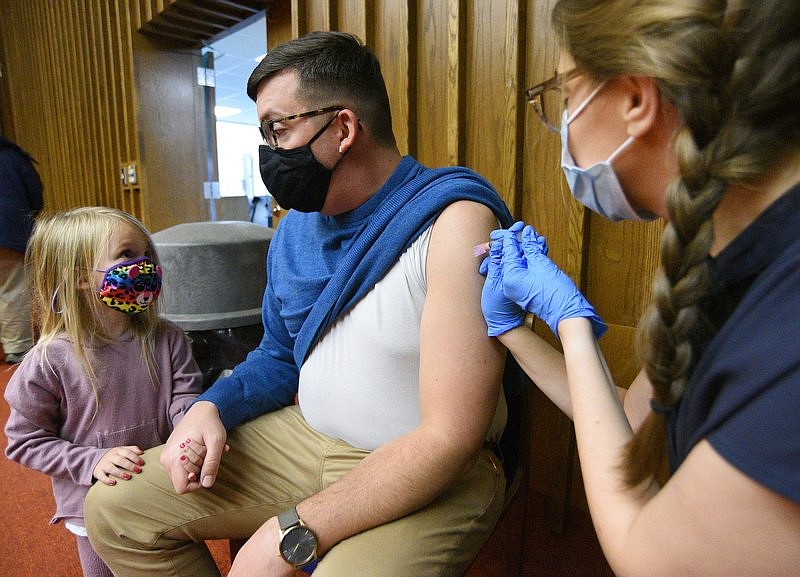Less than a month since it was first detected in the United States, the new omicron variant of the coronavirus has by far taken over as the dominant strain in the country and region.
"It is here and it's here in a big way. It came very, very quickly," Tennessee Health Commissioner Dr. Lisa Piercey said during a news briefing Wednesday. "Just to put it in context, it took about three months for the delta variant to be the predominant variant nationally. It took omicron about three weeks."
In the Southeast, more than 95% of new COVID-19 cases last week were due to omicron, according to tracking from the U.S. Centers for Disease Control and Prevention. Omicron cases are rapidly rising and became the dominant strain last week, according to data from the U.S. Centers for Disease Control and Prevention.
"It would be completely normal for you to think, 'Wait just a minute. You just told me last week you had four cases in the state, and now you're telling me it's the predominant variant?' That's how fast this thing is spreading," Piercey said.
Tennessee is averaging 3,729 new daily COVID-19 cases over the past week as of Tuesday - up from a weekly average of 1,337 new cases per day a month ago, according to Tennessee Department of Health data. And although new cases are on the rise, Piercey said she believes the case counts are "a significant underestimate" of the actual burden of disease due to the rise of at-home testing.
"At-home testing sometimes gets reported to us, occasionally gets reported to us, but we believe the vast majority of at-home testing is not coming across our radar," she said.
The new omicron variant of the coronavirus is drawing worldwide concern due to its unusually high number of mutations, which appear to help the variant better evade immune defense from vaccines, and because it's is three to five times more transmissible than the already highly contagious delta variant that ravaged the region in late summer.
Dramatic case surges across the nation are prompting event cancellations and some cities and states to reinstate mask mandates. The CDC recommends that even those who are fully vaccinated wear a mask indoors in public in areas of substantial or high transmission, which includes the Chattanooga region.
On Tuesday, the Georgia Department of Public Health issued an alert urging residents to carefully follow COVID-19 prevention measures during holiday celebrations and gatherings in the face of the rapidly spreading new variant.
"Regardless of the variant, mitigation and prevention measures for COVID-19 are the same," a news release from the department states, emphasizing the importance of vaccination, booster shots for those who are eligible, wearing well-fitting masks, physical distance and avoiding crowded indoor spaces.
"If you are sick or have symptoms of COVID-19, don't host or attend a gathering," the release states.
(READ MORE: Hospitalizations and cases of COVID-19 climbing in Georgia)
Though COVID-related hospitalizations are also on the rise, Piercey said it's too soon to know if they will reach or surpass the record-high levels of the last surge fueled by the delta variant, which also continues to wreak havoc in pockets of the nation and is still to blame for most COVID-related hospitalizations and deaths across the country.
"Hospitalizations are what we call a lagging indicator, which means sometimes it'll take one to two weeks for hospitalizations to start going up after cases go up. It just hasn't been enough time yet," she said.
Because it's so new, it's unknown whether omicron is more or less severe than delta. But even if it's milder, Piercey said she expects lots of people to become infected given omicron's transmissibility, and some of those people will inevitably become seriously ill.
In Hamilton County, new COVID-19 cases have been rising since Thanksgiving, with the Hamilton County Health Department posting 222 new cases on Wednesday - the highest number of new cases reported locally since mid-September.
(READ MORE: Chattanooga area holiday travels bring trepidation amid COVID-19 omicron variant)
Hospitalizations at this time are significantly lower than their delta peak, but the number of hospitalized patients with confirmed COVID-19 infection in the county has risen 36% in a week, from 61 to 96.
Although vaccines appear less effective in preventing omicron infections, leading medical and public health agencies are unwavering in the position that they remain the best tool to combat the pandemic, as vaccines continue to provide good protection from severe disease even with omicron.
Unvaccinated people account for the vast majority of COVID-19 hospitalizations and deaths, and fully vaccinated people who have received a COVID-19 booster shot will have significantly better protection than those with only two vaccine doses, Piercey said.
Contact Elizabeth Fite at efite@timesfreepress.com or follow her on Twitter @ecfite.
